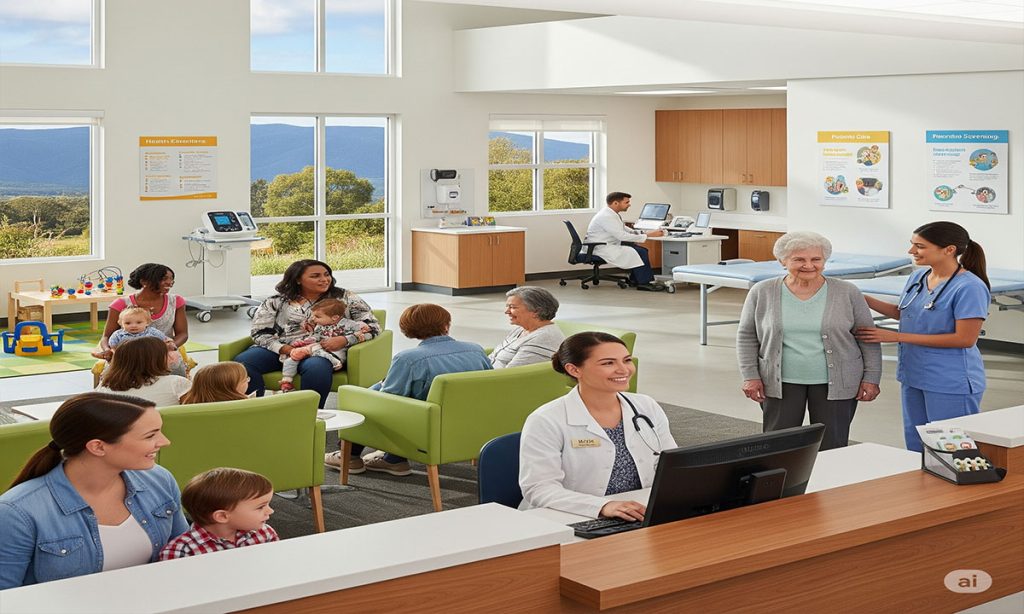Rogers Behavioral Health Services & Support is a leading nonprofit provider of specialized mental health and addiction treatment. It operates nationwide (with centers in ten states) and provides evidence-based care for patients of all ages. In the U.S., roughly 59.3 million adults (about 23% of the population) experience a mental illness each year, yet millions remain untreated. Rogers BH highlights that over 28 million Americans with mental health conditions are not receiving care, underscoring the critical need for its services. Rooted in compassion and excellence, Rogers BH’s mission is to help people reach their full potential through recovery and wellness.
Over the past 25+ years, Rogers BH has built a reputation for effective treatment. It’s known for a continuum of care – inpatient hospitals, residential programs, partial hospitalization, intensive outpatient (day) programs, and outpatient therapy – all tailored to individual needs. Patients receive trusted treatment for a wide range of conditions, including OCD and anxiety disorders, depression and bipolar disorder, eating disorders, trauma/PTSD, and substance use disorders. These programs use proven therapies (CBT, DBT, exposure therapy, etc.) delivered by expert clinicians. According to Rogers’ outcomes research, patients consistently report significant reductions in symptom severity from admission through discharge. This data-driven approach – with over 61,000 patients contributing to outcomes research – reflects Rogers’ commitment to transparency and efficacy.
Table of Contents
Rogers BH emphasizes a holistic, patient-centered approach. In addition to evidence-based therapies, treatment plans may include experiential activities (like wilderness therapy or yoga), family education, and life-skills training. Whether through individual counseling or group programs, Rogers therapists focus on the root causes of mental health issues, not just symptoms. This includes support for co-occurring issues – for example, treating an anxiety disorder alongside substance use – within integrated care plans. Patients can transition between levels of care (e.g. from inpatient to outpatient) without losing continuity, rogers behavioral health ensuring a smoother recovery process.
Services and Treatment Programs
Rogers BH offers comprehensive treatment programs across all levels of care. These include 24/7 inpatient psychiatric hospitals and residential units, Partial Hospitalization Programs (PHP/“day treatment”), Intensive Outpatient Programs (IOP), and standard outpatient therapy. Key programs include:
- OCD & Anxiety Disorders – Specialized cognitive-behavioral therapy (CBT) and Exposure & Response Prevention (ERP) help patients manage obsessive thoughts and anxious behaviors.
- Mood Disorders (Depression & Bipolar) – Evidence-based therapies and medication management address major depression and bipolar symptoms, with a focus on emotional regulation and wellness planning.
- Eating Disorders – Rogers behavioral health integrated medical and psychological support for anorexia, bulimia, and binge eating disorders, helping restore healthy eating patterns and body image.
- Trauma & PTSD – Trauma-focused treatments (e.g. prolonged exposure, EMDR) for victims of abuse, violence, or loss, aiming to reduce intrusive memories and improve coping.
- Substance Use & Co-occurring Disorders – Comprehensive addiction treatment that includes CBT, medication-assisted therapy, and support groups, often integrated with mental health care for co-occurring conditions.
Each program is staffed by multidisciplinary teams (psychiatrists, psychologists, nurses, etc.) dedicated to one-on-one support and group therapy. Rogers uses over 100 validated assessment tools to tailor care and track progress. Their Proven Outcomes studies show that patients often achieve significant symptom improvement by discharge and maintain gains 12 months later. In short, Rogers BH’s specialized treatment works: patients frequently report feeling empowered and ready for life’s next chapters after care rogers behavioral health.
Locations and Behavioral Health Centers
Rogers Behavioral Health is headquartered in Wisconsin but has a nationwide footprint. It serves communities in 10 states through a network of facilities. In Wisconsin alone, Rogers operates three inpatient hospitals (in Appleton, Green Bay, and Oconomowoc) and 15 residential treatment programs. Beyond Wisconsin, there are over 20 outpatient centers across the U.S.. These outpatient clinics provide services like therapy, medication management, and PHP/IOP. Examples of Rogers centers include campus locations in Atlanta, Minneapolis, Tampa, and Seattle, among others rogers behavioral health.
This broad geographic reach ensures patients can access support near home. For instance, families in Illinois can visit the Skokie or Hinsdale centers; those in Georgia can access the Atlanta campus; in Florida, Rogers has clinics in Miami and Tampa; and Rogers recently expanded into California (Los Angeles, San Diego, San Francisco) and other regions. Each center typically offers customized programs for children, adolescents, and adults.
Even if a Rogers BH facility does not meet a specific need, the staff will help refer patients elsewhere to ensure they receive the most appropriate care. In all locations, Rogers maintains high standards: they have earned The Joint Commission’s Gold Seal of Approval (an accreditation symbol of quality). Many centers also partner with local hospitals, allowing smooth transitions between acute medical and psychiatric care when needed by rogers behavioral health.
Insurance and Payment Options
Making care accessible is a priority for Rogers BH. They are contracted with many national insurance plans. Prospective patients are encouraged to have Rogers verify benefits by contacting their insurance carriers. To help families understand costs, Rogers provides an Insurance Pricing Calculator: an online tool that estimates out-of-pocket expenses (co-pays, deductibles) based on your specific health plan. This transparency (required by law for treatment facilities) allows you to plan financially before deciding on treatment by rogers behavioral health.
Financial Aid: Rogers also offers financial assistance programs for those who qualify, and will discuss payment plans if needed. The admissions team will walk you through options and paperwork. In short, Rogers BH strives to make treatment affordable: with insurance verification, calculators, and assistance policies, cost should not be a barrier to getting help. (Insurance coverage varies by state and plan, so always confirm with both Rogers and your insurer.)
Careers and Job Opportunities
For professionals seeking meaningful work, Rogers Behavioral Health Careers can be very rewarding. Rogers is a “leading nationwide provider of mental health and addiction treatment”, and it regularly hires across disciplines (nurses, therapists, counselors, doctors, support staff, etc.). On their careers page, Rogers emphasizes its supportive culture and the chance to “truly make a difference” in patients’ lives.
Employee Benefits: Rogers BH offers competitive benefits – including health insurance, dental/vision coverage, 401(k) with employer match, life insurance, tuition reimbursement, and generous PTO. Many staff cite the Good benefits and flexible schedules as positives. The organization also invests in professional development, mentorship programs, and wellness initiatives.
Rogers maintains equal employment opportunity policies – all applicants are considered without regard to race, gender, etc. – and hosts live career chats and events to recruit new team members. According to review sites, Rogers has hundreds of job postings and employee reviews. Glassdoor reports an overall 2.9/5 star rating from over 500 reviews (with 36% of employees recommending it). Indeed shows a 2.7/5 score from 265 reviews. While some reviews note areas for improvement (e.g. management, workload), many employees highlight the mission-driven culture, supportive colleagues, and “making a difference” aspect. Prospective employees can find openings on the Rogers website or on job boards of rogers behavioral health.
Patient Success Stories and Reviews
Rogers BH maintains a patient-focused reputation. The organization publishes numerous Success Stories and outcome data to illustrate effectiveness. Many patients speak to the compassion and expert care they received. For example, one testimonial reads: “Thank you for treating me like a human… it made all the chaos feel worth it.” (Source: Rogers BH patient story) rogers behavioral health. By its own measures, Rogers’ programs consistently achieve positive results – patients often leave treatment more stable and better able to handle life’s challenges.
Externally, Rogers BH holds high standards: it has The Joint Commission’s Gold Seal of Approval, and LegitScript certification, indicating compliance with healthcare regulations and quality metrics. These accreditations can reassure families that Rogers meets national care standards of rogers behavioral health.
That said, any large provider has varied reviews. Online ratings reflect mixed experiences: on Glassdoor, Rogers has a 2.9/5 employee rating, and Indeed shows 2.7/5. Patient review sites (like Yelp) also have both positive and negative comments. In general, satisfied patients praise the customized programs and caring staff, while critical reviews often cite dissatisfaction with insurance coverage, wait times, or administrative issues. It’s important for readers to consider multiple sources: talking to their healthcare provider, consulting referrals, or visiting a center can provide more personalized insight.
Overall, evidence and patient reports suggest that Rogers Behavioral Health’s services and support can be highly effective for the right individuals. They focus on long-term recovery – with 12-month follow-up studies showing sustained improvement – and help reduce the burden of untreated mental illness rogers behavioral health.
Frequently Asked Questions
Q: What conditions and services does Rogers Behavioral Health provide?
A: Rogers BH treats a wide spectrum of mental health and addiction issues. Programs cover OCD, anxiety disorders, depression, bipolar disorder, eating disorders, PTSD/trauma, addiction, and more. Care is offered at multiple levels – from 24/7 inpatient hospitalization (for acute crises) to residential programs, partial hospitalization (day programs), intensive outpatient (IOP), and regular outpatient therapy. Specialized programs exist for all ages (children, teens, adults) and many disorders.
Q: Where are Rogers Behavioral Health centers located?
A: Rogers has treatment centers in ten states across the U.S.. Key locations include Wisconsin (multiple sites like Appleton, Oconomowoc, Madison), Illinois (Hinsdale, Skokie), Minnesota (Minneapolis, St. Paul), Georgia (Atlanta), Tennessee (Nashville), Florida (Miami, Tampa), Pennsylvania (Philadelphia), and others. Each center’s services can vary – some have full hospitals, others outpatient clinics. You can find specific addresses on the Rogers website under “Locations.” Many patients travel from neighboring regions to the nearest center.
Q: Does Rogers Behavioral Health accept insurance and how much will it cost?
A: Rogers BH contracts with many major insurance plans. It is best to have an intake coordinator verify your coverage (they call insurers on your behalf). The Insurance Pricing Calculator on their site lets you estimate your expected co-pays/deductibles for each level of care. This tool is a valuable resource for financial planning. While coverage depends on your plan, Rogers also offers financial assistance programs for eligible families. In short: most patients use insurance to pay for Rogers treatment, and Rogers helps you understand those costs before you start.
Q: What job opportunities and careers are available at Rogers BH?
A: Rogers Behavioral Health frequently hires professionals in healthcare and support roles. Job listings include positions for psychiatrists, psychologists, counselors, nurses, occupational therapists, facility managers, and more. They advertise open positions on their website (linked under Careers) and through recruiting events. Employees report benefits like strong healthcare coverage, retirement plans, tuition assistance, and a mission-driven culture. Applicants can apply online or attend a Rogers job fair.
Q: How can I learn more or get help now?
A: To take the next step, interested individuals can call Rogers BH 24/7 at 833-308-5887 to speak with an admissions counselor. The Rogers website also offers an online contact form and resources (FAQs, videos, articles) to guide you. If you suspect you or a loved one need care, reach out right away – early help can make a big difference. Remember, Rogers BH is accredited and committed to quality care (Gold Seal of Approval), so asking questions and researching can ensure you feel confident about choosing Rogers.
Conclusion and Next Steps
Rogers Behavioral Health Services & Support provides high-quality, comprehensive mental health care that covers everything from inpatient hospitalization to outpatient therapy. With evidence-based programs, multiple U.S. locations, and a focus on patient wellness, Rogers BH can be a valuable resource for those struggling with mental health or addiction. Readers are encouraged to visit a Rogers center or call their helpline (833-308-5887) for a free screening and to discuss treatment options.
If you found this article helpful, please share it on social media or with someone who may benefit. Rogers BH also engages with the community online – you can follow them on LinkedIn, Facebook, YouTube and other platforms for educational content. Feel free to leave comments or questions below; community feedback and real stories can help others find hope and healing. Together, raising awareness about mental health support services like Rogers Behavioral Health can improve lives and break the stigma around seeking help.
Sources: Authoritative information on Rogers Behavioral Health’s services was drawn from Rogers BH’s official site, as well as national statistics (NIMH) and reputable review sites to ensure accuracy and transparency. All claims are backed by these sources as cited.






